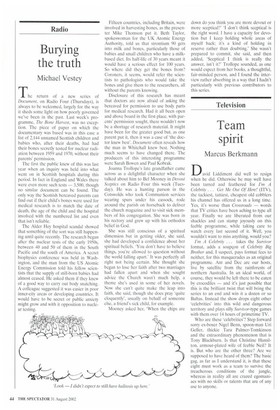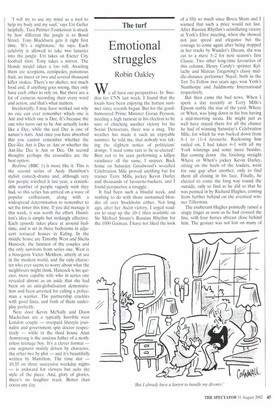Team spirit
Marcus Berkmann
David Liddiment did well to resign when he did. Otherwise he may well have been tarred and feathered for I'm A Celebrity . . . Get Me Out Of Here! (ITV), the tackiest, tattiest, cheapest old cobblers his channel has offered us in a long time. Yes, it's worse than Crossroads — words that TV critics have been aching to type all year. Finally we are liberated from our shackles and can stamp joyously on this feeble programme, while taking care to watch every last second of it. Well, you wouldn't want to miss anything, would you?
I'm A Celebrity . . . takes the Survivor format, adds a soupcon of Celebrity Big Brother and, I suspect, pays format fees to neither, for this masquerades as an original programme. Ant and Dec are our hosts, live by satellite from the rainforests of northern Australia. In an ideal world, of course, they would be left there to be eaten by crocodiles — and it's just possible that this is the brilliant twist that will bring the series to an end and win it a dozen or so Baftas. Instead the show drops eight other 'celebrities' into this wild and dangerous territory and plays silly Survivor-type games with them over 14 hours of prirnetime TV.
Who are these 'celebrities'? Step forward sorry ex-boxer Nigel Bean, spoon-man Uri Geller, thickie Tara Palmer-Tomkinson and the extraordinary phenomenon that is Tony Blackburn. Is that Christine Hamilton, armour-plated wife of feeble Neil? It is. But who are the other three? Are we supposed to have heard of them? The basic gag, as far as I understand it, is that these eight must work as a team to survive the treacherous conditions of the jungle, whereas in reality all are crazed egomaniacs with no skills or talents that are of any use to anyone.
'I will try to use my mind as a tool to help my body and my soul,' says Uri Geller helpfully. Tara Palmer-Tomkinson is struck by how different the jungle is to Bond Street. Tony Blackburn gets it right first time. 'It's a nightmare,' he says. Each celebrity is allowed to take two luxuries into the jungle. Uri takes an Exeter City football shirt. Tony takes a mirror. The blonde model takes a too roll. Awaiting them are scorpions, centipedes, poisonous fruit, an insect or two and several thousand killer snakes. There's no shelter, not much food and, if anything goes wrong, they only have each other to rely on. But there are a lot of cameras recording their every word and action, and that's what matters.
Incidentally, I may have worked out why no one can ever remember which one is Ant and which one is Dec. It's because the one who turns out to be Ant actually looks like a Dec, while the real Dec is one of nature's Ants. And once you have absorbed this you cannot remember whether the Dec-like Ant is Dec or Ant or whether the Ant-like Dec is Ant or Dec. On second thoughts perhaps the crocodiles are the best option.
Bedtime (BBC 1) is more like it. This is the second series of Andy Hamilton's stylish comedy-drama and, although very few people watched it last year, a remarkable number of people vaguely wish they had, so this series has arrived on a wave of popular enthusiasm, along with a widespread determination to remember to set the timer this time. If you did manage it this week, it was worth the effort, Hamilton's idea is simple but strikingly effective.
Each episode takes place at around bed time, and is set in three bedrooms in adjacent terraced houses in Ealing. In the middle house are Timothy West and Sheila Hancock, the funniest of the couples and the only survivors from series one. West is a bourgeois Victor Meldrew, utterly at sea in the modern world, and the only character who ever seems to worry about what the neighbours might think, Hancock is his qui eter, more capable wife who in series one revealed almost as an aside that she had been on an anti-global isation demonstration and been arrested for calling a policeman a wanker. The partnership crackles with good lines, and both of them underplay perfectly.
Next door Kevin McNally and Doon Mackichan are a typically horrible west London couple — overpaid lifestyle jour nalist and government spin doctor respectively — while in the third house Alun Armstrong is the anxious father of a moth erless teenage boy. It's a clever format — one segment mainly driven by character, the other two by plot — and it's beautifully
written by Hamilton, The time slot — 10.35 on three successive weekday nights — is awkward for viewers but suits the
style of the piece. And, glory of glories, there's no laughter track. Better than cocoa any day.



























































 Previous page
Previous page